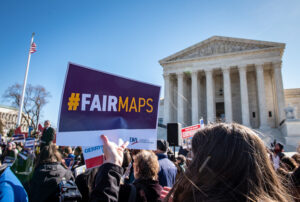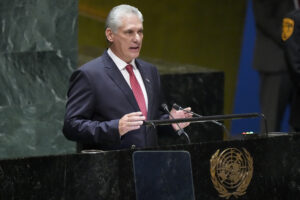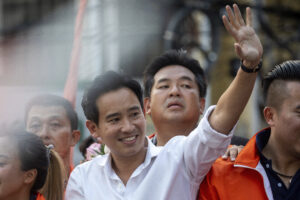Cold War Spin Only Compounds Georgian Crisis
History -- not democracy -- provides the explanation for the crisis in Georgia, in which the United States is recklessly involving itself.History — not democracy — provides the explanation for the crisis in Georgia, into which the United States is recklessly involving itself. The accompanying Washington blather is about saving plucky and democratic Georgia from the Russian wrath that has fallen upon it for attacking two even smaller and pluckier Caucasian enclaves, South Ossetia and Abkhazia, which reject what they consider Georgian oppression. So who is democratic and who is not?
Vengeance, hatred and personal careers have a lot to do with it, together with American global ambitions and this Russian government’s resentment of Washington. An instructively hysterical statement of what the administration claims this crisis is all about — or of what some people think it should be about — is provided by Melik Kaylan in The Wall Street Journal of Aug. 13: “We in the West are being challenged by Russia’s actions in Georgia to show that we have the nerve and the stamina to secure the gains not just of the wars in Iran and Afghanistan but of the entire collapse of Soviet power.”
If “we don’t draw the line here, it doesn’t get any easier down the road with any other border or country. We would be risking the future of Afghanistan, and the stability of Iraq, on the good will of Moscow and the mullahs in Tehran.” It’s 1938, and Munich all over again.
The troubles among Georgians, the Abkhazians and the Persian-speaking Ossetians go back to the 6th century B.C., but we will skip that. They all were pressed into the Russian empire at the beginning of the 19th century, and when the Bolsheviks came to power, they found themselves in the Soviet Union. In the interest of countering Georgian nationalism, Stalin gave the Ossetians and Abkhazians cultural and administrative autonomy.
When Boris Yeltsin told the people of the collapsing Soviet Union to “take all the independence you can,” the two small countries rebelled against the Georgian authorities and tried to declare independence. Their revolts, begun in 1991, were eventually suppressed at heavy cost by the Georgian government of the time, with enthusiastic ethnic cleansing and consequent population transfers, voluntary or otherwise, on all sides.
Afterward, peacekeeper regimes were set up with representatives from the enclaves and from Russia, which offered sympathy for their secessionist ambitions and built up common ties, and eventually (after Mikheil Saakashvili’s arrival) offered Russian passports for those citizens who wanted them. When Saakashvili became president of Georgia in 2003, the troubles started up again, since he campaigned on a promise to bring the separatists back under Georgian control. It was his life’s task, he said.
His courting of the United States — where he had studied and for a time worked — had everything to do with this reheating of Georgian nationalism and agitation for national unity. Who better to back him against internal enemies, with ties to Russia, than superpower America?
Superpower America gave him political help and support even when he had to turn out the riot police against protesters and declare a national emergency, as was the case last year. It sent military trainers and equipment for the Georgian army, and in return Georgia sent troops to help the U.S. in Iraq and Afghanistan.
He seemed an attractive figure to back in the Bush administration’s push to surround Russia with pro-American leaders (via the “color revolutions”) and potential or actual NATO governments (in violation of assurances given to Russia by the first President Bush, at the time the Soviet Union came to an end).
It helped that Georgia also occupies a strategic position on the trans-Caucasian routes for Caspian oil to reach the Black Sea and (via Turkey) the Mediterranean.
Earlier this year, the U.S. did its best to get the NATO Assembly to promise Georgia eventual membership, but Germany and France objected. Their reasoning was that Saakashvili’s government faced serious separatist opposition that enjoyed Russian sympathy, and that NATO has no business lending its support to slightly dubious figures making demagogic efforts to crush domestic opposition to national unification.
Saakashvili’s American backers cried out that this was “giving Russia a veto over a sovereign country’s decisions.” It was no such thing. It was keeping out of NATO a country facing potentially grave domestic troubles of no concern to the NATO allies, and possible and unnecessary trouble with Russia — as the events of recent days have demonstrated.
They might have added that NATO is supposed to be a serious organization, providing a solemn treaty commitment to go to war in mutual defense of its individual members. It debases, and might destroy, NATO if membership is used to support reckless and unilateral policies on the part of any of its members, including the United States.
Visit William Pfaff’s Web site at www.williampfaff.com.
© 2008 Tribune Media Services, Inc.
Your support matters…Independent journalism is under threat and overshadowed by heavily funded mainstream media.
You can help level the playing field. Become a member.
Your tax-deductible contribution keeps us digging beneath the headlines to give you thought-provoking, investigative reporting and analysis that unearths what's really happening- without compromise.
Give today to support our courageous, independent journalists.






You need to be a supporter to comment.
There are currently no responses to this article.
Be the first to respond.